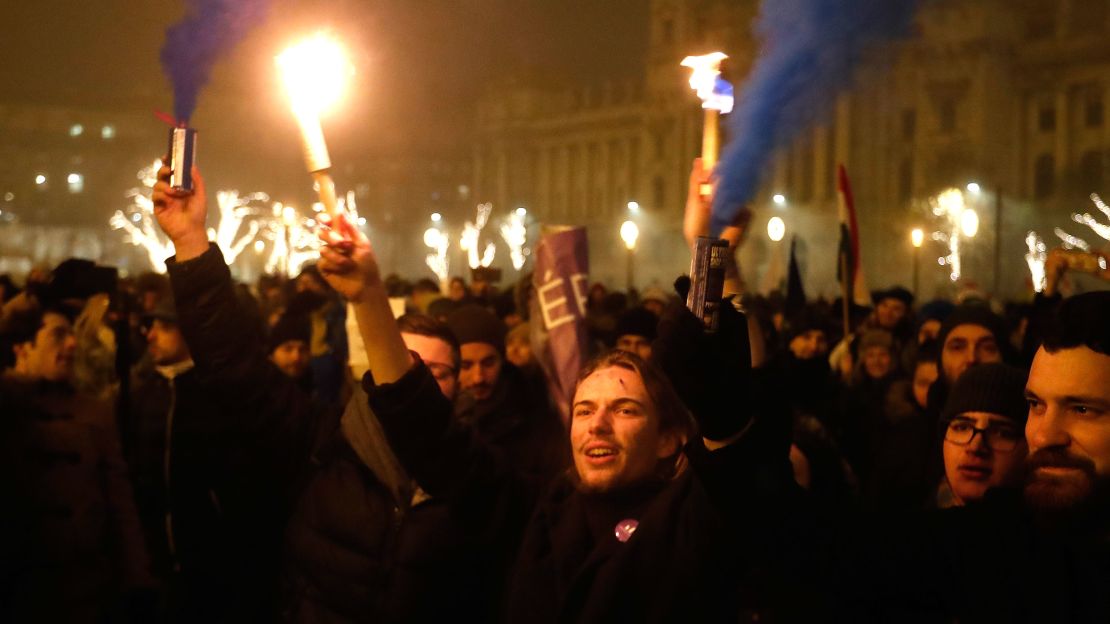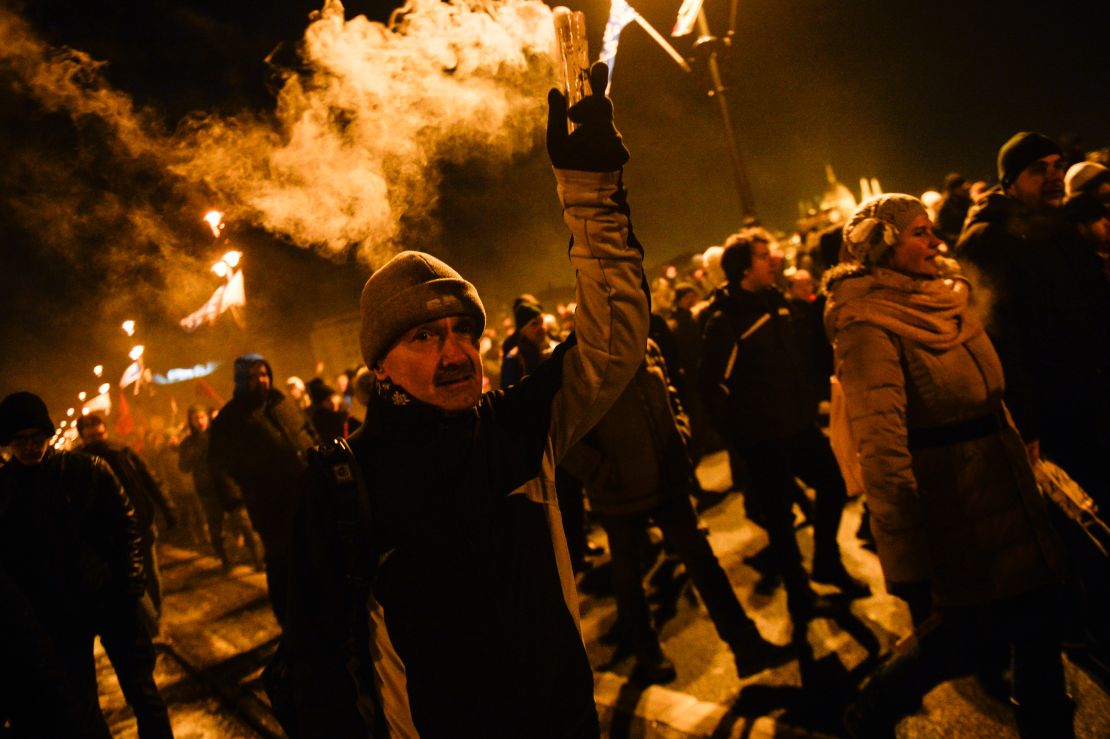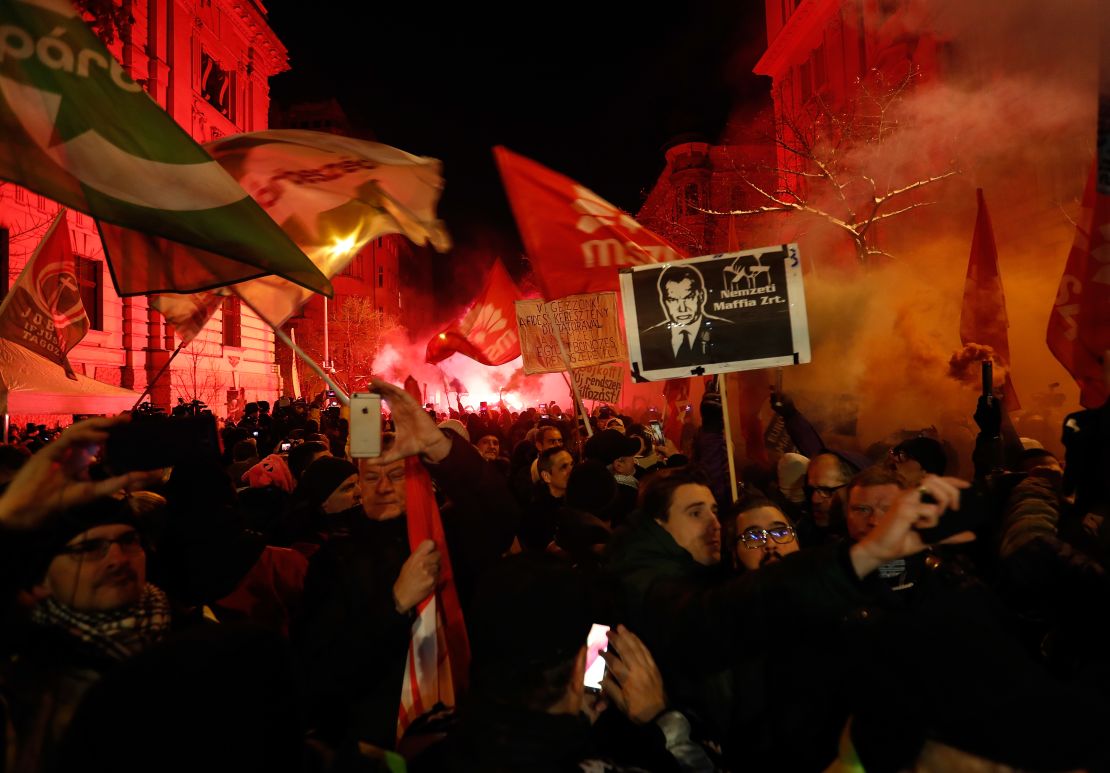From the far-right to the left, opposition parties across Hungary’s political spectrum have been showing unity against what they consider the increasingly authoritarian rule of Prime Minister Viktor Orban and his ruling Fidesz Party.
Thousands of Hungarians have marched through Budapest – some chanting “Vik-ta-tor” (an amalgamation of Viktor and dictator) and waving pro-democracy placards – since the government passed several laws on Wednesday that critics say will tighten Orban’s grip on power.
One of the new laws will allow employers to demand up to 400 hours of overtime annually; critics have dubbed it the “slave law.” Another will create a new government-controlled court system.
But what began last week as a rally against the overtime law has expanded into several days of demonstrations against Orban’s government.
On Monday evening, thousands protested outside the headquarters of Hungary’s state-run broadcaster MTVA, chanting anti-government slogans and shouting “we’ve had enough.”
It was the sixth night of protests against the government, condemned as “Filthy Fidesz” by the protesters. Pictures from the scene showed people bringing the demonstrators hot tea, food and even warm socks.

Around a dozen opposition members of parliament entered the building earlier on Monday and asked to be given airtime. Four lawmakers said the standoff led to them being manhandled by the broadcaster’s security guards.
“I protest because our parents left a free and democratic country (for) us in 1990 and now we are at their age and we (are learning) again how to fear,” a former English teacher, who asked not to be named because her current employer relies on government funding, told CNN on Monday.
“I protest because they stole our past, (our) present and the future of our children. And I protest because my beloved country lost its freedom.”
Experts have said these protests are different from previous unrest in the country in 2014 and 2016.
“It is the first time opposition parties, inside and outside parliament, are cooperating and working together to prevent these laws from taking effect,” Bulcsu Hunyadi, senior analyst at Budapest think tank Political Capital, told CNN.
‘Slave law’ and parallel courts
Campaigners say the labor law doesn’t have much support among Hungarians, and that the government is doing little to heed their concerns.
“The so-called ‘slave law’ amendment is hugely unpopular, polls have shown that 80% of Hungarians are against it. So not only is it unpopular, but the way it was pushed through parliament was also very upsetting,” Marta Pardavi, co-chair of the Hungarian Helsinki Committee, a human rights group, told CNN.
The law will increase the number of overtime hours companies can demand from workers in a year from 250 to 400 hours. It allows employers to delay overtime payments for up to three years.
The government told CNN that the “voluntary changes to working hours” were “in the interest of the workers” and would allow people to work and earn more.
The changes come as the country faces a labor shortage, exacerbated by a shrinking population and declining birth rate.
The other controversial law will create new courts, overseen by Orban’s justice minister, to handle cases concerning “government business,” such as taxes and elections.

Rights groups said it undermines the separation of powers between the executive and judicial powers, paving the way for government political interference.
“It is the final nail on the coffin of executive control of the judiciary,” Pardavi said.
The government told CNN that the new courts, which are set to begin operating next year, will be independent and “in line with current European approaches and standards.”
Growing numbers
On Sunday, demonstrations in Budapest swelled to an estimated 11,000 people as largely peaceful protesters in sub-zero temperatures marched to parliament. There were also smaller protests in at least seven other cities, police told CNN.
“In the past few years, protests usually concentrated in Budapest,” Pardavi said.
“[On Sunday] there were protests in several towns in Hungary. The profile of protesters is very mixed, one can see flags of [the far-right party] Jobbik and the flags of the leftist opposition parties being waved.”
Police confirmed there were protests outside Budapest in seven cities on Sunday, including Debrecen, Gyor, Szeged, Bekescsaba and Miskolc.
After the rally at parliament ended on Sunday, a pocket of several thousand protesters marched to the headquarters of MTVA. Some attempted to storm the building. Video and images show officers in riot gear firing tear gas into the crowd during the confrontation.
Live-streamed video posted by CNN affiliate ATV Hungary showed reporters trapped in a crowd of protesters unable to move, as well as people crouched on the ground temporarily blinded by the tear gas.
The protesters – who are made up of disparate groups of opposition parties, trade unions and students – have made five demands to the government: for the labor law to be abolished, a decrease of the police force’s work hours, an independent judiciary, for Hungary join the European Public Prosecutor’s Office, and an independent public media.
On Monday, opposition lawmakers entered MTVA headquarters to read the five demands on television. “State media is making no mention of their presence or demands. But there is news on migrants,” tweeted journalist Benjamin Novak.
The broadcaster refused to give the MPs airtime and some of the lawmakers were forcibly removed from the building.
Opposition MPs Bernadett Szel and ákos Hadházy were filmed being removed from MTVA headquarters by security guards.
Another lawmaker, László Varjú, from center-left party the Democratic Coalition, was seen being driven away in an ambulance. He told local radio station Club that he was covered in bruises from a scuffle with the broadcaster’s security guards.
MP ágnes Vadai, who was outside the building, said she was also manhandled by the guards.
“We are here to try to recapture … democracy,” Péter Jakab, a spokesman for the Jobbik party, told CNN from inside MTVA on Monday. “At the moment armed guards are protecting an institution producing fake news … what will happen? We do not know. Life is the biggest director.”
In a statement to CNN, the broadcaster did not address all the MPs allegations, but instead accused them of scaring MTVA’s employees. “The opposition politicians tried to blackmail MTVA by saying that if their demand [was] not be met, thousands of angry people might ‘come in’ from the street.”
“Hadházy tried to get into the operational area by sneaking over a handrail. Security personnel warned and called upon him and, as he did not desist, he was removed from the building together with Szél who was hanging on to him,” the statement added.
The standoff ended when around a dozen members of parliament left the headquarters on Monday evening.
Government blames opposition, Soros for protests
“The opposition is calling on people to commit acts of violence against police,” the Prime Minister’s office said on Monday of the protests.
It also said the organizer’s included “a great number of ‘George Soros’s subsidized people.’”
The Hungarian-American philanthropist and billionaire is Orban’s foe, and a frequent punching bag for the Hungarian government and media outlets controlled by Orban allies, experts said.
The protests come on the heels of Hungary’s “Stop Soros” law, which banned non-governmental organizations from assisting undocumented migrants.
Earlier this month, Central European University, which was founded by Soros, said it had been “forced out” of Hungary in “an arbitrary eviction.” The US State Department said it was disappointed by the move and described it as “a loss” for Hungary.

“Those who criticize the government’s policies or speak up against corruption or human rights violations will be stigmatized as ‘traitors’ or ‘Soros-agents,’ and face the risk of political, legal, administrative or financial measures to limit their scope of actions,” analyst Bulcsu Hunyadi said.
Since Orban’s populist Fidesz Party swept into power in 2010, and most recently won a landslide victory in April this year in the face of an uncoordinated opposition, it has come under increasing fire from the European Union over its crackdowns on democratic institutions.
Earlier this year, the European Parliament took the unprecedented decision to trigger Article 7 – a disciplinary process – against Hungary over its erosion of democratic norms that spanned everything from the media to migrants.
Andrea Keleti reported from Budapest. Tara John reported and wrote from London. Sheena McKenzie contributed from London.

